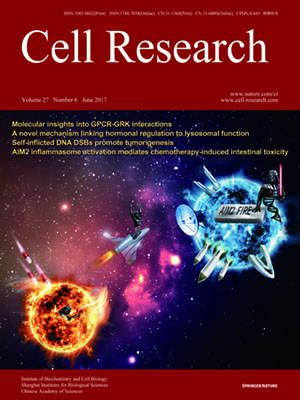
Volume 27, No 6, Jun 2017
ISSN: 1001-0602
EISSN: 1748-7838 2018
impact factor 17.848*
(Clarivate Analytics, 2019)
Volume 27 Issue 6, June 2017: 784-800
ORIGINAL ARTICLES
Chemotherapy-induced intestinal inflammatory responses are mediated by exosome secretion of double-strand DNA via AIM2 inflammasome activation
Qiaoshi Lian1,4,*, Jun Xu2,4,*, Shanshan Yan1,5,*, Min Huang2,*, Honghua Ding6, Xiaoyu Sun3, Aiwei Bi2, Jian Ding2, Bing Sun1,3 and Meiyu Geng2
1State Key Laboratory of Cell Biology, CAS Center for Excellence in Molecular Cell Science, Shanghai Institute of Biochemistry and Cell Biology, Chinese Academy of Sciences; University of Chinese Academy of Sciences, 320 Yueyang Road, Shanghai 200031, China
2Division of Antitumor Pharmacology, State Key Laboratory of Drug Research, Shanghai Institute of Materia Medica, Chinese Academy of Sciences, Shanghai 201203, China
3CAS Key Laboratory of Molecular Virology & Immunology, Institute Pasteur of Shanghai, Chinese Academy of Sciences, 320 Yueyang Road, Shanghai 200031, China
4University of Chinese Academy of Sciences, Beijing 100049, China
5School of Life Sciences, University of Science and Technology of China, Hefei 230022, China
6Department of Oncology, Shanghai General Hospital, Shanghai Jiao Tong University School of Medicine, Shanghai 200080, China
Correspondence: Meiyu Geng, E-mail: mygeng@simm.ac.cn; Bing Sun, E-mail: bsun@sibs.ac.cn; Jian Ding, E-mail: jding@simm.ac.cn; Min Huang,(mhuang@simm.ac.cn)
Chemotherapies are known often to induce severe gastrointestinal tract toxicity but the underlying mechanism remains unclear. This study considers the widely applied cytotoxic agent irinotecan (CPT-11) as a representative agent and demonstrates that treatment induces massive release of double-strand DNA from the intestine that accounts for the dose-limiting intestinal toxicity of the compound. Specifically, “self-DNA” released through exosome secretion enters the cytosol of innate immune cells and activates the AIM2 (absent in melanoma 2) inflammasome. This leads to mature IL-1β and IL-18 secretion and induces intestinal mucositis and late-onset diarrhoea. Interestingly, abrogation of AIM2 signalling, either in AIM2-deficient mice or by a pharmacological inhibitor such as thalidomide, significantly reduces the incidence of drug-induced diarrhoea without affecting the anticancer efficacy of CPT-11. These findings provide mechanistic insights into how chemotherapy triggers innate immune responses causing intestinal toxicity, and reveal new chemotherapy regimens that maintain anti-tumour effects but circumvent the associated adverse inflammatory response.
10.1038/cr.2017.54
FULL TEXT | PDF
Browse 2038


